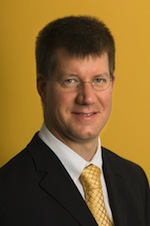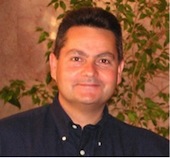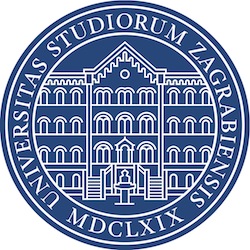Keynote Speakers
We are very pleased to have acquired the services of an excellent selection of keynote speakers for the symposium. The speakers and the titles of their talks are shown below.
Prof Michael Luck
King's College London, UKBehaviour Regulation and Normative Systems
More details ...
Prof Wolf Ketter
Erasmus University, NetherlandsCompetitive Simulations: Lessons learned from the Trading Agent Competition
More details ...
Prof Kimon Valavanis
University of Denver (DU), USAChallenges in Unmanned Systems Swarms
A wireless, multi-agent distributed system perspective
More details ...
Prof Michael Luck
King's College London, UKBehaviour Regulation and Normative Systems
Abstract:
Cooperation is the fundamental underpinning of multi-agent systems, allowing agents to interact to achieve their goals. However, agents must manage the risk associated with interacting with others who have different objectives, or who may fail to fulfill their commitments. There are many ways in which such a desirable social order may be encouraged or even mandated. For example, trust offers a mechanism for modeling and reasoning about reliability, honesty, etc, while organisations and norms provide a framework within which to apply them, and motivations provide a means for representing and reasoning about overall objectives. In this talk, I will consider the role of all these aspects, with a particular focus on norms in regulating behaviour.

Biography:
Michael Luck is Professor of Computer Science and Head of the Department of Informatics at King's College London, where he undertakes research into agent technologies and intelligent systems. His work has sought to take a principled approach to the development of practical agent systems, and spans formal models and theories as well as practical applications. Recent work has been directed at norms, contracts and institutions, declarative programming of agent systems, industrial deployment and technology forecasting.
Professor Luck has published around 200 articles in these and related areas, and twelve books (including monographs, textbooks, and edited collections); he was lead author of the AgentLink roadmaps in 2003 and 2005. He is a a director of the board of the International Foundation for Autonomous Agents and Multi-Agent Systems (IFAAMAS), co-founder of the European Multi-Agent Systems (EUMAS) workshop series, co-founder and Chair of the steering committee of the UK Multi-Agent Systems Workshops (UKMAS), and a Steering Committee member for the Central and Eastern European Conference on Multi-Agent Systems (CEEMAS). Professor Luck was a member of the Executive Committee of AgentLink III, the European Network of Excellence for Agent-Based Computing, having previously been the Director of AgentLink II. He is an editorial board member of Autonomous Agents and Multi-Agent Systems, the International Journal of Agent-Oriented Software Engineering, Web Intelligence and Agent Systems, and ACM Transactions on Autonomous and Adaptive Systems, and was previously series editor for Artech House's Agent Oriented Systems book series. Michael Luck was general co-chair of the Ninth International Conference on Autonomous Agents and Multiagent Systems (AAMAS 2010).
Prof Wolf Ketter
Erasmus University, NetherlandsCompetitive Simulations: Lessons learned from the Trading Agent Competition
Abstract:
Many important developments in artificial intelligence have been stimulated by organized competitions that tackle interesting, difficult challenge problems, such as chess, robot soccer, poker, robot navigation, stock trading, and others. Economics and artificial intelligence share a strong focus on rational behavior. Yet the real-time demands of many domains do not lend themselves to traditional assumptions of rationality. This is the case in many trading environments, where self-interested entities need to operate subject to limited time and information. With the web mediating an ever broader range of transactions and opening the door for participants to concurrently trade across multiple markets, there is a growing need for technologies that empower participants to rapidly evaluate very large numbers of alternatives in the face of constantly changing market conditions. AI and machine-learning techniques, including neural networks and genetic algorithms, are already routinely used in support of automated trading scenarios. Yet, the deployment of these technologies remains limited, and their proprietary nature precludes the type of open benchmarking that is critical for further scientific progress.
The Trading Agent Competition was conceived to provide a platform for study of agent behavior in competitive economic environments. Research teams from around the world develop agents for these environments. During annual competitions, they are tested against each other in simulated market environments. Results can be mined for information on agent behaviors, and their effects on agent performance, market conditions, and the performance and behavior of competing agents. After each competition, competing agents are made available for offline research. We will discuss results from various competitions (Travel, Supply-Chain Management, Market Design, Sponsored Search, and Power Markets).

Biography:
Wolfgang Ketter is Associate Professor of Information Systems at the Department of Decision and Information Sciences at the Rotterdam School of Management of the Erasmus University. He received his Ph.D. in Computer Science from the University of Minnesota in 2007. He founded and runs the Learning Agents Research Group at Erasmus (LARGE) and the Energy Research Center. The primary objective of LARGE is to research, develop, and apply autonomous and mixed-initiative intelligent agent systems to support human decision making in the area of business networks, electronic markets, energy grids, and supply-chain management. He was co-chairing the TADA workshop at AAAI 2008, the general chair of the Trading Agent Competition (TAC) 2009, is member of the board of directors of the Association for Trading Agent Research (ATAR) since 2009, and its chair since 2010. He is leading Power TAC, a new TAC competition on energy retail markets; the pilot competition was held at International Joint Conference of Artificial Intelligence (IJCAI) 2011 in Barcelona. Since 2011 Wolfgang also serves as the chair of the IEEE Task Force on Energy Markets. He was the program co-chair of the International Conference of Electronic Commerce (ICEC) 2011. His research has been published in various information systems, and computer science journals such as AI Magazine, Decision Support Systems, Electronic Commerce Research and Applications, European Journal of Information Systems, INFORMS OR/MS Today, INFORMS Information Systems Research, and International Journal of Electronic Commerce. He serves on the editorial board of Electronic Commerce Research and Applications.
Prof Kimon Valavanis
University of Denver (DU), USAChallenges in Unmanned Systems Swarms
A wireless, multi-agent distributed system perspective
Abstract:
Networked swarms may be considered as heterogeneous, distributed agent-based systems (or distributed wireless sensor networks), where the concept/definition of an 'agent' may be interpreted in the most general sense. This is true for networked swarms of unmanned systems, as well as manned-unmanned systems, where the term 'agent' may be thought of as (an individual) 'asset'. When considering swarms in (fixed or loose) 2-D/3-D formations, each swarm may be also thought of as a 'group of agents' with initially specific, but dynamically and in real-time modifiable goals pertaining to an assigned mission or missions. As such, when studying such swarms, there are major challenges related to navigation and control, communications (including secured inter- and intra- swarm communication), coordination and collaboration, robustness and fault tolerance, security, to name just a few.
In this seminar, the 'connection' between the swarm formation consideration and the 'distributed (agent-based) sensor network' consideration will be established. Assets will be considered as sensor nodes, and the overall swarm as a sensor network. A well integrated methodology will be presented, in which on top of navigation/control aspects, communication and networking aspects as well as software security will be discussed. The swarm formation will be dictated / modified based on communication/data transmission requirements, in addition to control requirements. Further, it will be shown how networked swarms / distributed agent-based systems may be organized in architectures comprised of swarms, each containing a 'swarm head' as leader with all 'swarm heads' being connected via a backbone network.
Case studies of aerial, ground and aerial-ground unmanned vehicle swarms will be demonstrated experimentally.

Biography:
Dr. Kimon Valavanis is a Professor and Chair of the Electrical and Computer Engineering Department at the University of Denver (DU), Colorado, USA, and the Director of the DU Unmanned Systems Laboratory (DU2SL). His research interests are focused in the areas of unmanned systems, distributed intelligence systems, robotics and automation. He has authored, co-authored and/or edited nine books and published over 320 book chapters, technical journal/transaction and peer-reviewed conference papers. He also holds several patents.
Prior to his present position at DU, professor Valavanis held various faculty positions from Assistant to Full Professor, starting from the Northeastern University, Boston (1987-1990), followed by the University of Louisiana at Lafayette (1991-1999), the Technical University of Crete, Greece (1999-2003), and the University of South Florida (2003-2008). He is also a Guest Professor at University of Zagreb, Croatia, since 1996. Over the years he has founded several laboratories in the areas of robotics, automation and intelligent systems, which he also directed, and he also served as director and deputy director of other laboratories and research centers, member and chair of university graduate program, and chair of industrial advisory board and technical council. He has been involved in many technical conferences, serving also as General, Program, Registration, and Local Arrangements Chair. He was the Associate Editor in IEEE Transactions in Robotics and Automation (R&A), and Editor in Chief (EiC) of the IEEE R&A Magazine, and now he is the EiC of the Journal of Intelligent and Robotic Systems. He also served as a member of the IEEE R&A Society Awards Committee, and as co-chair/chair of the Aerial Robotics and Unmanned Aerial Vehicles Technical Committee.
Dr. Valavanis received the Diploma in Electrical and Electronic Engineering (1981) from the National Technical University of Athens, Greece, the M.Sc. degree in Electrical Engineering (1984) and the PhD degree (1986) in Computer and Systems Engineering from Rensselaer Polytechnic Institute (RPI). He is a Senior Member of IEEE and a Fellow of the American Association for the Advancement of Science. He is also a Fulbright Scholar.





